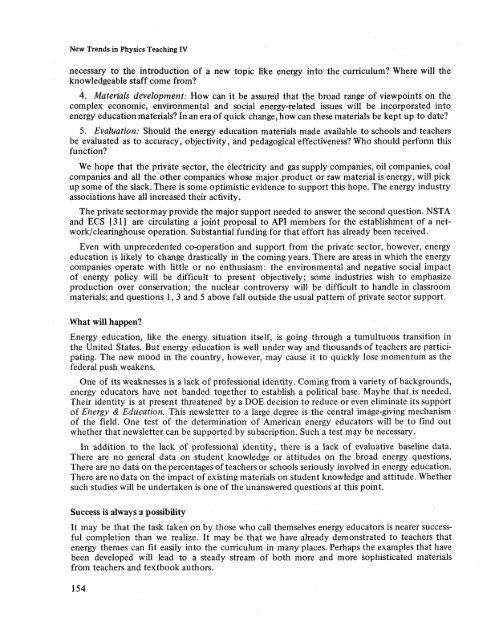New trends in physics teaching, v.4; The ... - unesdoc - Unesco
New trends in physics teaching, v.4; The ... - unesdoc - Unesco
New trends in physics teaching, v.4; The ... - unesdoc - Unesco
You also want an ePaper? Increase the reach of your titles
YUMPU automatically turns print PDFs into web optimized ePapers that Google loves.
<strong>New</strong> Trends <strong>in</strong> Physics Teach<strong>in</strong>g IV<br />
necessary to the <strong>in</strong>troduction of a new topic like energy <strong>in</strong>to the curriculum? Where will the<br />
knowledgeable staff come from?<br />
4. Materials development: How can it be assured that the broad range of viewpo<strong>in</strong>ts on the<br />
complex economic, environmental and social energy-related issues wil be <strong>in</strong>corporated <strong>in</strong>to<br />
energy education materials? In an era of quick change, how can these materials be ke.pt up to date?<br />
5. Evaluation: Should the energy education materials made available to schools and teachers<br />
be evaluated as to accuracy, objectivity, and pedagogical effectiveness? Who should perform this<br />
function?<br />
We hope that the private sector, the electricity and gas supply companies, oil companies, coal<br />
companies and all the other companies whose major product or raw material is energy, will pick<br />
up some of the slack. <strong>The</strong>re is some optimistic evidence to support this hope. <strong>The</strong> energy <strong>in</strong>dustry<br />
associations have all <strong>in</strong>creased their activity.<br />
<strong>The</strong> private sector may provide the major support needed to answer the second question. NSTA<br />
and ECS [31] are circulat<strong>in</strong>g a jo<strong>in</strong>t proposal to API members for the establishment of a network/clear<strong>in</strong>ghouse<br />
operation. Substantial fund<strong>in</strong>g for that effort has already been received.<br />
Even with unprecedented co-operation and support from the private sector, however, energy<br />
education is likely to change drastically <strong>in</strong> the com<strong>in</strong>g years. <strong>The</strong>re are areas <strong>in</strong> which the energy<br />
companies operate with little or no enthusiasm: the environmental and negative social impact<br />
of energy policy wil be difficult to present objectively; some <strong>in</strong>dustries wish to emphasize<br />
production over conservation; the nuclear controversy wil be difficult to handle <strong>in</strong> classroom<br />
materials; and questions 1, 3 and 5 above fall outside the usual pattern of private sector support.<br />
What wil happen?<br />
Energy education, like the energy situation itself, is go<strong>in</strong>g through a tumultuous transition <strong>in</strong><br />
the United States. But energy education is well under way and thousands of teachers are participat<strong>in</strong>g.<br />
<strong>The</strong> new mood <strong>in</strong> the country, however, may cause it to quickly lose momentum as the<br />
federal push weakens.<br />
One of its weaknesses is a lack of professional identity. Com<strong>in</strong>g from a variety of backgrounds,<br />
energy educators have not banded together to establish a political base. Maybe that is needed.<br />
<strong>The</strong>ir identity is at present threatened by a DOE decision to reduce or even elim<strong>in</strong>ate its support<br />
of Energy & Education. This newsletter to a large,degree is the central image-giv<strong>in</strong>g mechanism<br />
of the field. One test of the determ<strong>in</strong>ation of American energy educators wil be to f<strong>in</strong>d out<br />
whether that newsletter can be supported by subscription. Such a test may be necessary.<br />
In addition to the lack of professional identity, there is a lack of evaluative basel<strong>in</strong>e data.<br />
<strong>The</strong>re are no general data on student knowledge or attitudes on the broad energy questions.<br />
<strong>The</strong>re are no data on the percentages of teachers or schools seriously <strong>in</strong>volved <strong>in</strong> energy education.<br />
<strong>The</strong>re are no data on the impact of exist<strong>in</strong>g materials on student knowledge and attitude. Whether<br />
such studies wil be undertaken is one of the unanswered questions at this po<strong>in</strong>t.<br />
Success is always a possibility<br />
It may be that the task taken on by those who call themselves energy educators is nearer successful<br />
completion than we realize. It may be that we have already demonstrated to teachers that<br />
energy themes can fit easily <strong>in</strong>to the curriculum <strong>in</strong> many places, Perhaps the examples that have<br />
been developed wil lead to a steady stream of both more and more sophisticated materials<br />
from teachers and textbook authors.<br />
154
















